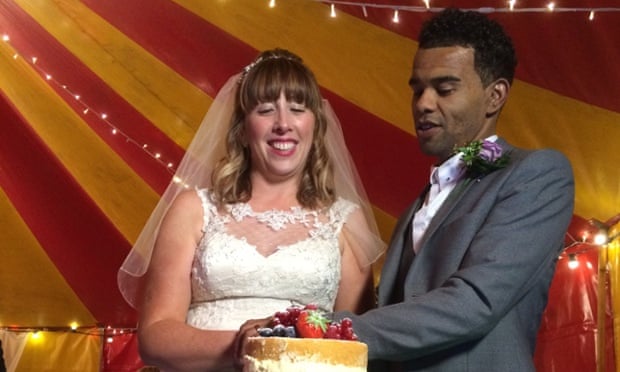when it was announced that BBC3 was under threat and was likely to become online-only (the official line is that it’s still “under review”), my first thought was: “Get your grubby touchscreen-swiping fingers offDon’t Tell the Bride”. The reality-documentary series, which got through 83 episodes and 21 specials in its original home, was a comforting perennial, like a cheese toastie. It wasn’t fancy, it wasn’t complicated, but it put just enough of a spin on your regular reality-show cheddar sandwich to make it worth your while. The BBC clearly agreed with this pained metaphor and brought it over to BBC1, where it began its primetime slot on Wednesday night.
Don’t Tell the Bride should be awful. It gives the groom full control of his wedding, which he must plan in secret, and a budget of £12,000. He does everything, from booking the venue and entertainment to choosing the bridesmaids’ dresses and planning the hen do. Its entire premise is a sort of 1970s washing powder ad conceit that, when it comes to heterosexual relationships, all men are a bit useless and insensitive and dim, and all women are romantic and demanding and shrill, and if you put those two traits together on the most stressful day of people’s lives, then decent television is born.
It worked on BBC3 because those gender stereotypes often fell apart by the end, and it was less about “Men, eh!” than it was about seeing how relationships of all different stripes either thrived or dissolved under pressure. It was about seeing how much they knew each other, and how much they loved each other. For eternally nosy people, that sort of insight is as fascinating as any upscale HBO drama about, say, crime and masculinity.

I was nervous about its move to BBC1, because the average age of a BBC1 viewer is 59, and the average age of a BBC3 viewer is not (though at 33, it’s not youth, either), and that meant a wholesale transplant was unlikely. There have certainly been tweaks to the format, though not enough that a first-timer would spot the newness of it. This is a slightly smoother, more sentimental show, with bigger notes and a more transparent emotional path. For a show about weddings, it is little surprise that it moves towards a conclusion that love conquers all, but part of the intrigue of this show in the past has been the sense that maybe it doesn’t. This sounds like a cynical message for an upbeat programme, and, of course, I prefer it when there’s a happy ending, but there needs to be the possibility that it will not come, or else this is a paint-by-numbers format. Perhaps later episodes will address this.
But for now, here are Jenni and Andrew, slightly older than the usual DTTB couples. They have been together for nine years after meeting in Ibiza, and they have two kids. Jenni’s pelvis dropped during her last pregnancy and this has left her in a wheelchair most of the time, and wary of leaving the house. “She’s still my Jen, at the end of the day,” says Andrew, sweetly. “I just want my identity back,” says Jenni, more sadly. Andrew is portrayed as a happy-go-lucky, lackadaisical kind of man, thus throwing into question whether he will be able to cope with spending £14,000 – they’ve upped the budget for the big time – on their ceremony. He calls it “my wedding”. Jenni firmly corrects him: “Our wedding.” This does not bode well. “I trust you!” she screams out of the cab window, as she leaves him to it for three weeks, with the transparent desperation of a woman who does not trust him at all.
Andrew goes through the motions of being a disaster. He decides to ignore his alarm – with the cameras present, so it can’t have been a particularly restful lie-in – and misses his slot for booking the church in time. The one thing Jenni doesn’t want is a register office wedding, but as his last-minute options dwindle, she ends up with a register office wedding. Andrew plans an Ibiza-themed reception in a circus tent in a pub car park. “But we haven’t got the sun. Or the sea. Or the sand,” points out an observant friend. He buys bridesmaid dresses in the sale, £20 from Debenhams. “Half-price rack. Blue. There you go. Done.” He caresses a wedding dress that looks as if it is pioneering a brand new embroidery technique involving intestines. He makes Jenni pay for her own hen do. If only he had a wake-up call!
Andrew gets a wake-up call. The orchestra swells in the background as he finds his heart. He chooses a beautiful wedding dress, and Jenni loves it. They gloss over the bit where she sobs with disappointment as she pulls up to the register office, and her family crowd around her, telling her it will be OK. They rush to the reception, where dancers in fairy wings hang from the top of the circus tent, there are dancers dressed like Daft Punk, and Andrew shows her a timeline of pictures he has planted in sand to remind her of how far they have come. “See, that’s romance,” says Jenni, who learns a bigger lesson from the day, which is that she doesn’t need to hide in her bedroom any more. This is a sweeter, less spiky version of Don’t Tell the Bride. Despite the extra cheese, I’m still watching.
read more:evening dresses uk